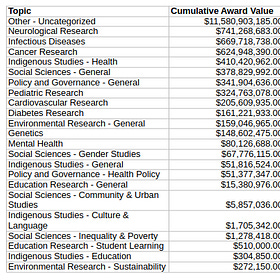Is Canada Wasting Millions on Redundant Health Studies?
Dr Adam Cifu - over at Sensible Medicine - recently listed ten health-related areas that require exactly zero new research projects. Sure, you can never know for sure what unexpected benefits might come from any research. But in a world of financial and resource constraints, you’re forced to be selective.
Here are a few of Dr. Cifu’s black-listed topics:
Smoking. We already know it’s dangerous. Tell patients not to smoke.
Exercise. Just do it.
Observational nutrition studies. You’ll never overcome confounding variables to confidently discover the perfect diet.
Dementia prevention. “Have good genes and maintain a healthy lifestyle”. That’s all we can know.
Poverty. We already know there’s a measurable correlation with negative health outcomes.
Now we’re all free to agree or disagree with those or any other topics Dr. Cifu mentioned. And here’s one particularly robust rebuttal. But I thought it would be interesting to search through funded research in Canada for a sense of how prevalent such “useless” projects were.
I used the Canadian Institutes for Health Research site to access information on 1,779 research projects that CIHR funded in 2024. The total amount of public money spent on those projects came to around $802 million. With the help of some A.I.-driven analytics, I managed to identify only 19 studies matching Dr Cifu’s list. Those studies received just over $9 million in federal funding. I guess that’s really not too bad. But it does demonstrate that there’s room for improvement.
With all the usual caveats (including that I might well have misunderstood the purpose of some or all of this research and that Dr. Cifu himself might disagree with my choices), here are the project titles for those 19 “useless” studies:
Identifying Risk Factors and Informing Preventative Strategies to Reduce the Incidence of Mild Cognitive Impairment and Subsequent Dementia by Analysing the Canadian Longitudinal Study of Aging Using Advanced Statistical Methods and Machine Learning
Nutrition and physical activity as lifestyle strategies to manage sarcopenia and mental health: a holistic approach for people living with cirrhosis
Nothing burns like the cold! Comparing the metabolic benefits of cold exposure versus exercise in individuals with prediabetes.
A two-arm randomized controlled trial evaluating a physical activity counselling intervention for young adults diagnosed with cancer
Effects of GLP1 agonist-induced weight loss on cerebral and blood markers of neurodegeneration in individuals with obesity and genetic risk for Alzheimer's disease.
Multinational Assessment of Risk factors and Vascular disease in Elders with dementias using Longitudinal cohort studies: The MARVEL Project
Bridging Knowledges: Integrating Indigenous and Western Scientific Knowledge Systems in Nutrition and Physical Activity Research
Bridging the gap: Evaluating the real-world impact of Comprehensive School Health initiatives on physical activity, nutrition, and mental health/well-being of elementary school children
The Neighbourhood Built Environment and Physical Activity: A Comparative Analysis between Canadian-born, Recent, and Long-term Immigrants.
STRIVE before surgery trial: a pragmatic multicenter randomized trial of Structured TRaining to Improve fitness in a Virtual Environment before surgery
ShQUooz Circle: Nurturing the Next Generation through Physical Activity and Cultural Knowledge
Novel markers of risk for age-related neurodegeneration, senescence, and cognitive decline in adults with substance use disorders
The impact of tobacco smoking during pregnancy on the long-term risk of cardiovascular disease in women.
Co-design of Indigenous dementia Resources in Canada and AustraLia (CIRCLE): Enhancing health communication for Indigenous peoples along the dementia journey
Preventing post-stroke cognitive impairment and dementia with multimodal exercise training
Integrating Indigenous and Interprofessional Knowledge to Develop a Culturally Safe Evidence-Based Dementia Prevention Intervention for Indigenous Peoples in Northwestern Ontario
Partnerships in motion: Fostering active and healthy cities by exploring local and international partnerships for physical activity
Exercise as a novel therapy to reverse post-sepsis immune suppression
Unraveling the role of income inequality in the bidirectional relationship between obesity and depression among adolescents living in Ontario: Exploring the chain-mediation effects of public health funding and public health programs
I’ve already written plenty of stuff on healthcare in Canada and, in particular, on healthcare research:
Do Canadians Benefit From Government-Funded Clinical Research?
I want to be clear that this post is about measuring the value of funding for clinical research and not about funding for disease treatment and public education - both of which clearly fall at least partially within the scope of government responsibilities.
Bad Research Still Costs Good Money
I have my opinions about which academic research is worth funding with public money and which isn’t. I also understand if you couldn’t care less about what I think. But I expect we’ll all share similar feelings about research that’s actually been retracted by the academic journals where it was published.
The Health Research Funding Scandal Parading in Plain View
Right off the top I should acknowledge that a lot of the research funded by the Canadian Institutes for Health Research (CIHR) is creative, rigorous, and valuable. No matter which academic category I looked at during my explorations, at least a few study titles sparked a strong “well it’s about time” reaction.
Looking for a reference guide to the Government of Canada?
I just published Accessing the Machinery of State: A Directory of Canadian Federal Agencies.
And if you’re more interested in diving into the data from which that 462-page book was built, you can purchase that on Gumroad.





